In this post, we will show you how to blackout parts of the screen in Windows 11/10. While Focus Assist can be handy, to increase your focus, you can hide the screen area(s) behind a black box or window and that part won’t visible at all. This can come in handy when you want to focus on some application, some video or movie, a specific part of the desktop screen, etc. For doing this, we have covered some best free tools to blackout specific screen areas in Windows 11/10.
Blackout parts of computer screen to reduce distractions
The tools covered in this post work differently. For example, while one tool lets you use multiple black strips to hide screen areas, another tool lets you select a custom area to make it visible and blackout the rest of the screen area. You can check and use any tool based on your requirements.
- CinemaDrape
- Zorro
- Tunnel Vision
- Blackout
- Kino.
Let’s have a look at these tools.
Blackout screen on Windows 11/10 PC
1] CinemaDrape
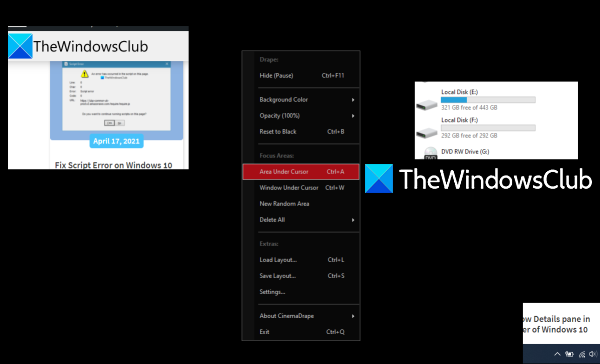
CinemaDrape is one of my favorite tools when it comes to hiding Windows 10 screen excluding a particular area. This tool has multiple options that make it a good competitor to other tools covered in this post. Here are some of its important options:
- You can select multiple areas on the Windows screen by dragging and dropping the mouse cursor at random positions. All those areas will be visible and other areas will remain hidden
- It also lets you drag n drop any specified area to some other position on your desktop screen
- You can select any custom background color to hide screen areas
- Background color opacity can also be adjusted using a slider
- It also lets you select an active window to make that window visible and hide or blackout the rest of the screen
- The option to save your layout and restore the saved layout is also there.
Here is the link to its homepage. Grab its installer or portable and launch the tool. Once activated, it covers the entire screen with a black background. Now you can select areas and only those areas will visible.
To use other options, simply right-click on the black area and the list of all options (like background color, opacity, window under cursor, etc.) will be visible to you. For most of the options, hotkeys are available to use this tool easily. Just spend some time getting familiar with the tool and then you can use it without any difficulty.
2] Zorro
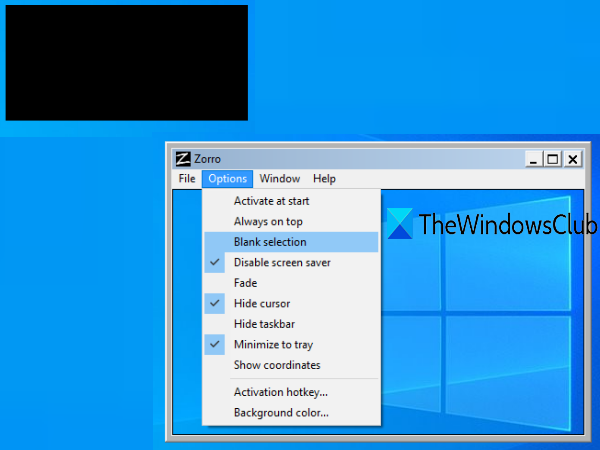
Zorro is a very simple tool that lets you select a custom area of your choice to blackout that area of the screen. You just need to adjust the size of its interface and activate this tool to hide the selected area with black color. If you want, you can also use some other color of your choice to hide the desktop screen.
One interesting feature that comes with this tool is that you can blackout the entire screen excluding the selected area. For that, you need to toggle the Blank selection option available under the Options menu of this tool.
Apart from that, this tool also lets you set other options such as set a hotkey to blackout part of the screen and exit blackout when not needed, hide the taskbar, hide the cursor behind the black screen, use any of the pre-defined sizes to hide a specific part of the screen, etc.
Click here and grab its installer or portable version. Launch this tool and its interface will open. Now you can adjust the size of its interface and move it to any part of the screen. After that, use the Options menu to change background color, set a hotkey, enable the hide taskbar option, etc.
Finally, when you are ready, use the hotkey or use the File menu and click on Activate option to blackout the screen based on the size set by you. To de-activate the software, use the same hotkey, and its main interface will be visible again. The tool works well but its option to minimize the tool to the system tray doesn’t work. So, you just need to close the tool when not needed.
3] Tunnel Vision
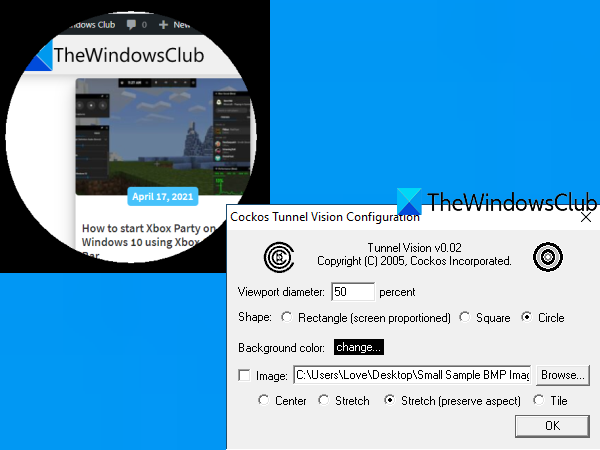
Tunnel Vision is a portable tool. This tool is very interesting. If you want to show only the area covering the viewport diameter of the mouse cursor and blackout the rest of the Windows screen, then you can try this tool.
You can also set the viewport diameter percentage from 1 to 100. The higher the percentage, the more will be the visible area. Wherever your mouse cursor goes, that area will be visible based on the diameter percentage set by you, and the rest of the area will be hidden behind the black color.
This tool also lets you change the viewport shape to rectangle, square, or circle. Apart from that, the background color can also be changed from black to any custom color.
Get its zip file, extract that file, and execute its EXE file. The tool will sit silently in the system tray. However, while running it for the first time, it automatically enables or activates the tool with a 10% viewport diameter only. This might annoy you as the visible area would be too limited. In that case, you need to right-click on its system tray icon and uncheck Enable Tunnel Vision option.
After that, the very first thing you need to do is select configure option present on its system tray by using the right-click menu. This will open its configuration window. Now you can set viewport diameter percentage, view shape, and background color. An option to set a background image (BMP) is also there but it didn’t work for me. When you’ve configured the options, press OK to close the configuration window.
Now, enable the tool again, and it will start working based on the options set by you.
4] Blackout
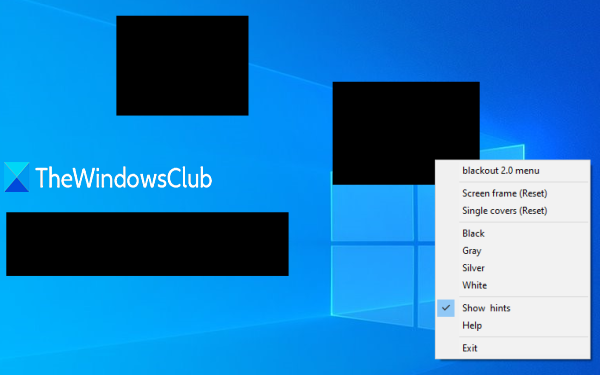
Blackout is one of the best tools to blackout part of the screen of a Windows 11/10 PC. This tool provides two options to hide the screen area. These are:
- Screen frame: This option provides a big black frame that covers the desktop screen from all the positions (top, left, right, and bottom) and the center section is visible. You can also resize the frame to any size of your choice
- Single cover: This option lets you use four separate frames to hide different parts of the screen or open windows. When this option is selected, a stripe is visible on the right section. You can drag n drop that stripe to add frames to hide screen areas. All the frames can be placed at any position and the size of each frame can also be changed separately using the mouse cursor.
For both the options, it also lets you change frame color. Black, White, Silver, and Gray color are available to choose from.
Get the setup file of this tool and install it. Run the tool and it will automatically start with the Screen frame option and hide the screen area accordingly. You can adjust the size as per your requirement.
To change the blackout mode or change the color, right-click on the blackout part and you will see the available options. Use the options and the tool will work accordingly.
When you want to access other opened applications, use the Win key to access the taskbar and minimize this tool or simply close it.
5] Kino
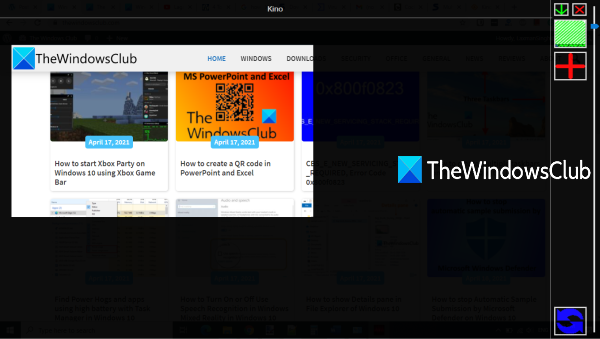
Kino is another useful tool to blackout part of the Windows 10 screen. This tool lets you select an area of your choice and only that area is visible. The rest of the area is covered with black color. This tool also lets you adjust the opacity level from 0 to 100 for the background area. A slider is available to make the background area completely invisible or set opacity level as per user needs.
Read next: How to unhide or hide desktop icons in Windows 11/10.
Click here to get the set-up file of this tool. Install it and open the interface. Its window will cover the entire desktop. In that window, the following options are present on the right part:
- Plus button: A red color plus button is available to select a custom area of the desktop screen. Simply press n hold the left mouse button and drag n drop it to select the area
- Slider: Move the slider up to cover the background with black color and move down the slider to adjust the opacity level
- Pause/Break button: to minimize the tool to the taskbar.
Use the given options and the tool will serve you accordingly.
Hope you like these tools.